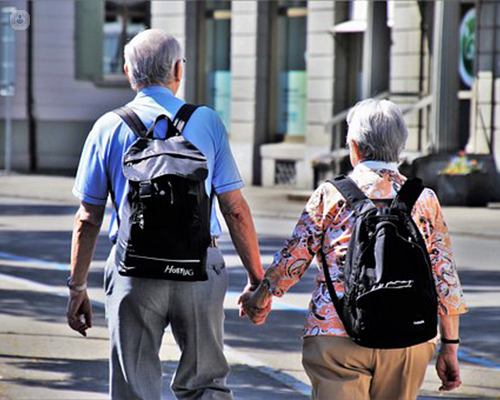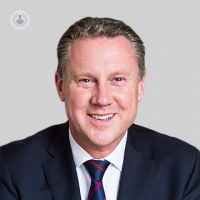What you should know before having knee replacement surgery
Escrito por:Having knee problems and arthritis of the knee can become hugely debilitating for many people, and for some, knee replacement surgery is the best option. Mr Jonathan Monk, a leading orthopaedic surgeon, answers the questions his patients, including Dame Judi Dench, ask prior to knee surgery. You can view the video of Dame Judi Dench talking about her own experience of having knee replacement surgery with Mr Monk below.

Common symptoms experienced before having knee replacement surgery:
- Limping
- You may hear the sound of bones touching each other as motion is made with the joint.
- Difficulty sleeping and getting comfortable
- Stiffness in the joint
When is knee replacement necessary?
Knee replacement surgery represents the final stage in the treatment of arthritis of the knee. It is an extremely effective treatment for the pain and is used when other modalities of treatment, such as physiotherapy, lifestyle changes and steroid injections, have stopped working.
When is the best time to have surgery?
Everyone is different and everyone’s symptoms will be different. Whilst some people can manage well with their symptoms, others will find their pain to be very debilitating. Hence, I believe it is ideal to intervene with a patient before they reach this stage of debilitating pain and discomfort. This is because, if a patient is avoiding activities that cause pain, such as a weekend walk, the pain will be managed but the muscles surrounding the joint will become deconditioned, making recovery following surgery more difficult.
Does it help to be fit before surgery?
Being in good physical shape does help make recovery easier and there are increasing amounts of evidence that suggest that if you are able to have physiotherapy before your operation, then you will do better after surgery. However, physiotherapy is usually walking, so if you are remaining mobile before your operation, already you will be helping yourself in the long-run.
How long does it take to recover from knee replacement surgery?
The recovery from knee replacement surgery can take some time, but the good news is that it is only generally the first couple of weeks after surgery that are particularly painful. Within six weeks patients are back to most of their activities, but the knee can be sore still. The difference between before and after the surgery is that the pain tends to be predictable and therefore relatively easily controlled by painkillers.
Physiotherapy plays a huge part in the recovery process and helps to get the pain under control. Whilst getting back into exercise after surgery can be intimidating, it is very important for your recovery and does require a bit of effort and concentration, but it is worth doing. There is also a lot to be said for having motivation and a goal in mind; if you know you need to be feeling better, you are more likely to make that happen for yourself by being committed to recovery and physiotherapy. It is also important to understand that you won’t be pain-free straight away, but with some time and with physiotherapy you can be.
What about revision knee surgery?
Revision knee surgery will not be considered until at least a year following the first operation. This is because knees continue to improve and get better for up to a year after knee replacement surgery. However, this can vary from patient to patient, and sometimes intervention may be needed within a year after surgery.
How important is having help at home following surgery?
Depending on your home set-up, having help at home for the first couple of weeks is very helpful in making your recovery easier. If your house is on multiple floors, for example, some patients find it helpful to move their bed to the ground floor so that stairs don’t have to be managed straight away. Patients also find it very reassuring to have company and it can give them the confidence they might need to get up and start moving after their operation.
What is physiotherapy like?
Following surgery, it is advised that patients start being mobile within a few days of the procedure. Hence, this can feel quite overwhelming and can be painful initially, but this improves with time and with therapeutic exercises. The more you do your physiotherapy, the easier movement and mobility become.
Can you still feel stiffness in the joint after surgery?
Even after surgery, you may still feel stiffness in the replaced joint, especially after sitting for a prolonged period. However, you will quickly loosen up with movement and walking around, with the main difference being that you are not also experiencing pain following recovery from surgery.
What range of movement do you have after surgery?
During surgery, movement will be tested to ensure that the leg can be fully extended (where the leg is straight) and bent up as much as possible, to at least allow the heel to touch the thigh. Hence, the range of movement following surgery should be as full as possible. However, if you have had a limited range of movement before surgery, it is common for you to have this after surgery too. This highlights again how important it is to have surgery before your motion becomes more limited.
How does hip replacement surgery compare to knee replacement surgery?
From my experience, as an orthopaedic surgeon that treats both hips and knees, people generally recover more quickly following hip replacement surgery, however, that does not mean that knee replacements are less effective in any way, recovery is just a slower process.
Knee replacement surgery is an extremely successful operation that has changed the lives of countless patients. If you are interested in finding out your treatment options, make an appointment with an expert.


